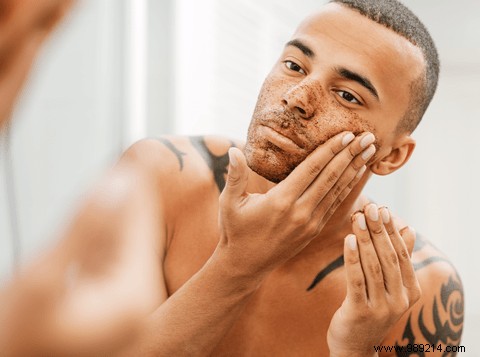Our skin naturally renews itself daily as old cells die and new ones emerge. Regular exfoliation removes dead skin cells, promoting smoother, brighter, and more supple skin. With options like enzymatic, chemical, and grain exfoliators, selecting the right one depends on your skin type. Here's our expert breakdown.

Daily aggressors like cold weather, wind, pollution, and heavy makeup can dull your skin and hinder renewal. A quality exfoliator clears dead cells, purifies the surface, and boosts cell turnover for a refreshed glow.
Exfoliation revives dull complexions, softens texture, and enhances radiance. It unclogs pores, balances sebum, and combats blackheads or breakouts, allowing skin to breathe better and renew efficiently. Explore our curated selection of facial scrubs for every skin type!
The ideal exfoliation frequency varies by skin type: once weekly for normal skin; up to twice for oily skin with gentle products; every two weeks for dry, sensitive, or reactive skin. Over-exfoliating risks irritation or breakouts—avoid it, especially in summer when skin needs protection from UV rays.
The most popular choice, grain scrubs use fine particles from fruit pits, shells, or flowers (finer for face than body). Opt for gentle, natural formulas in organic skincare.
Grain-free and gentle, enzymatic exfoliators rely on fruit enzymes (AHAs) to dissolve dead cells. Ideal as masks or peels—leave on for minutes for effective, non-abrasive results.
Using acids like glycolic (anti-aging), salicylic (for oily/combination skin's purifying action), or lactic (radiance-boosting for all types), select based on your skin to minimize irritation.
Unsure of your skin type? Take our skin diagnosis test:

Avoid grains to prevent inflammation. Choose salicylic acid-based chemical exfoliants for purification and pore-tightening. Try Patyka's Micro-Peeling Radiance Essence to even tone, boost glow, and fade spots.
Gentle options like enzymatic, chemical, or ultra-fine grain scrubs prevent excess sebum. Rhassoul powder offers antibacterial softening.
Enzymatic exfoliators with nourishing oils (jojoba, sweet almond) or butters hydrate while renewing. We recommend Kadalys Musaclean Organic Green Banana Peeling Mask—no harsh rubbing needed.
Stick to enzymatic for minimal irritation; space sessions and limit time. La Canopée's Perfect Exfoliation Fruit Acid Mask is ideal.
Exfoliate evenings on clean skin (after double cleansing). Massage gently in circles, avoiding eyes. For chemical/enzymatic, leave on 10 minutes (mild tingling is normal), then rinse with lukewarm water. Watch Julie, our beauty expert, for pro tips in this video.
Hydrate immediately with your moisturizer or oil; skip sun exposure. Apply SPF the next day. What's your skin type and go-to exfoliator? Share in the comments!